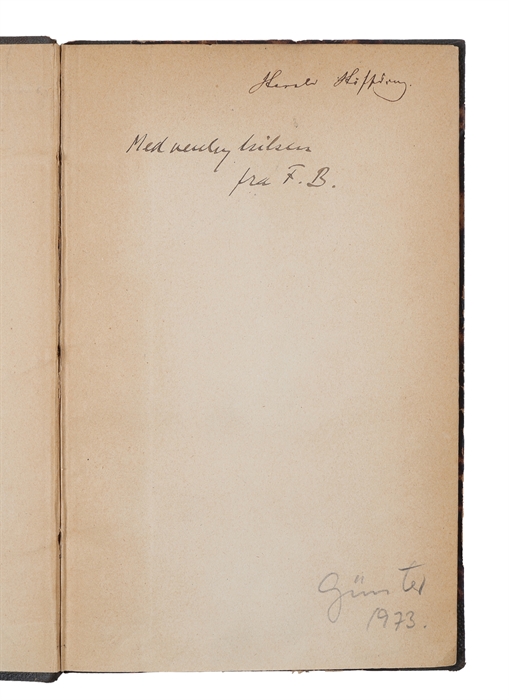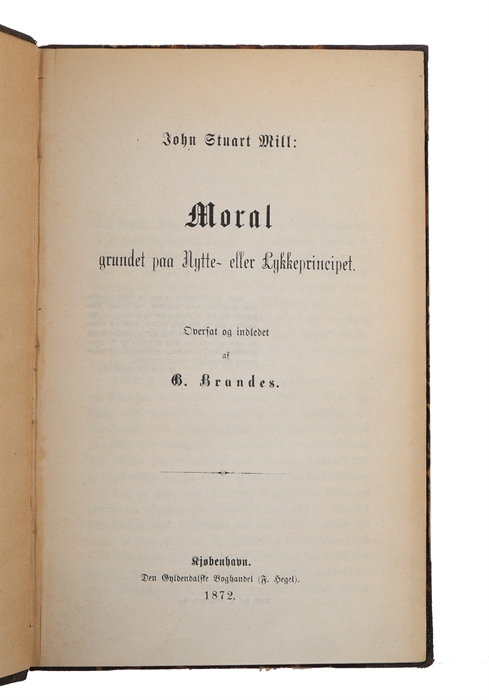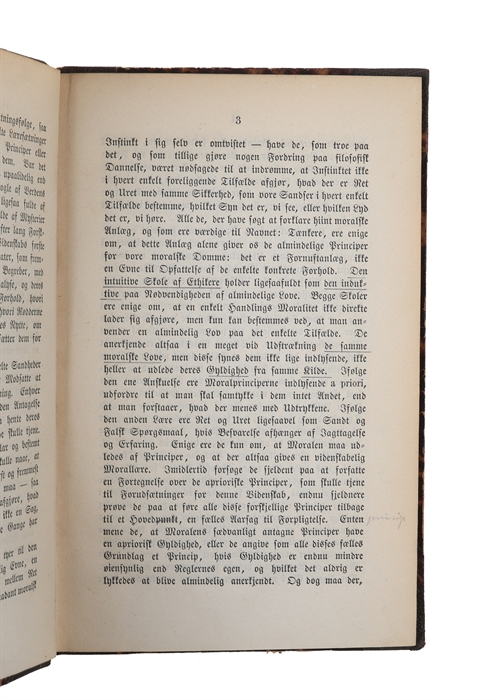THE STARTING POINT FOR THE WELFARE STATE
MILL, JOHN STUART.
Moral grundet paa Nytte- eller Lykkeprincippet. Oversat og indledet ved G. Brandes.
Kjøbenhavn (Copenhagen), Gyldendal, 1872.
8vo. Contemporary brown half cloth with gilt lettering to spine. Capitals worn and wear along edges. Internally a bit of light scattered brownspotting, but overall very nice. With numerous pencil-underlinings as well as pencil-markings, and -annotations, the latter in Høffding's hand (the underlinings possibly in Brandt's). With the ownership signature of Harald Høffding to front free end-paper and with a later presentation-inscription from Frithiof Brandt (signed F. B.) underneath. Recent ownership signature in pencil to foot of front free end-paper (1973). (2), VIII, 85, (1) pp.
Scarce first edition of the first Danish translation of Mill’s seminal “Utilitarianism”, translated by the great Georg Brandes and with the most excellent provenance, namely that of the founder of the welfare principle, which laid the groundwork for the welfare state as we know it today, Harald Høffding, with his numerous handwritten notes, annotations, and markings, and later given to someone by Høffding’s pupil, the important Danish philosopher Frithiof Brandt. Mill’s “Utilitarianism” constitutes a classic within the field of moral and political thought and is considered "the most influential philosophical articulation of a liberal humanistic morality that was produced in the nineteenth century." (Encycl. Of Philosophy). Originally published as a series of three separate articles in 1861, it was collected and printed as a single work under the canonical title in 1863. This publication is now considered the classic exposition and defense of Utilitarianism in ethics, a revolution within moral philosophy. The work was translated into Danish by the immensely influential literary critic Georg Brandes, by many considered the greatest intellectual of his time. Brandes played a key role in introducing especially German and British thought to Scandinavia, most notably the works by such thinkers as Darwin and Nietzsche. He is also the first to translate Mill’s works and make them accessible to a Scandinavian readership. His translation of “Utilitarianism” appeared in 1872 and was responsible for spreading the utilitarian philosophy to a wider audience in the North, indirectly - through Høffding - contributing to the formation of the welfare state that the Scandinavian countries are so famous for. It was through the reading of primarily Mill and Bentham that Harald Høffding came to develop his welfare principle, a principle that he is the first in the world to work out, and the principle upon which the modern welfare state is founded. He is primarily inspired by Mill’s Utilitarianism, but comes to largely replace the conceptions of utility and happiness using instead the welfare principle as a specification of the yardstick that must be used to evaluate actions. “The object of the welfare-principle is not the individual or momentary inclination, rather the lasting vital necessities of the human race, and therefore it places the point of judgment at the effects of an action.” (Thyrring Andersen, p. 105). “In the abandonment of the Christian ethics, positivism had to try to give the grounds for a morality which does not seek refuge with a divine authority. The contribution of Harald Høffding lies in a continuation of the utilitarianism in Jeremy Bentham and John Stuart Mills, whose normative theories on ethics claim that the correct ethically is the one that compared to the other options produces the greatest amount of positive values. And that means that the ethical values of an action depend on its ability to increase the amount of happiness. The principle of utility is formulated this way: The greatest possible happiness for the greatest possible number of people. Among the problems in this ethics are how different forms of values can be compared, which yardstick they can be measured by, and how a just and/or fair distribution of boons can be based.” (Thyrring Andersen, p. 104). Høffding had his starting point in Utilitarianism, but he transcended the more narrow principle of happiness. His welfare principle does not identify the supreme good with the happiness of the individual, “but considers the utmost purpose of being as the appearance of men of sterling characters, who have a feeling of happiness in working for the common good. … a decisive precondition of this was the commandment concerning charity in the Gospels and the historical development of this in Christianity.” (Thyrring Andersen, p. 109). Georg Brandes was the leading intellectual of his time in Denmark and must be credited with bringing European thought to Scandinavia, not only through his incredibly popular and famous lectures, but also through his own writings and not least through his translations of the most important works of the period into Danish. In Denmark, Brandes was synonymous with “the modern breakthrough” and therefore, for most, also the symbol of democracy and what we today would call welfare-thinking. At a closer look, however, Brandes was also in many ways an anti-democrat and so influenced by the thoughts of Darwin and especially Nietzsche that his views came to be very much opposed to those of a society based on a welfare principle that Høffding came to develop. “[I]t was Høffding who was the first in the world to work out a welfare-principle, namely in his “Etik” (Ethics) in 1887. Today, Høffding is not widely known, but in his lifetime and up to the 1950ties he was an internationally famous philosopher, whose works were translated into many languages and who was several times nominated for the Nobel Prize.” (Andersen, A.T.: The Dialogic and Religious Theme of Welfare in Harald Høffding…, p. 104). His great work "Etik", in which he developed the welfare-principle, constitutes an ethical system. Here, Høffding discusses the principal questions in order to develop a scientific ethics, or a moral science if one will, analyzes the ethical principles that are expressed in ethical assessments, and on the basis hereof develops an individualistic and a social ethic that was way ahead of its time, but which found great resonance within the reading public. The book had an enormous impact. It appeared five times in Høffding’s life-time, sold extremely well, and was quickly translated into German and French – “Denmark had gotten its first internationally known and acknowledged philosopher, several decades before Kierkegaard had his breakthrough on the international scene.” (Koch, Dansk filosofi i positivisments tidsalder, p. 41 – translated from Danish). “Høffding became a mentor to many – not least because of the humanity that marks this book [i.e. Ethics] and because of the well-balanced treatment it gives of the social and political questions of the time, of the relationship between the sexes and between church and state, just to mention a few of the “important life conditions” it deals with. Students in personal crisis contacted him, and people in difficult circumstances wrote to him for advice. Not least because of his ethical view, he came to appear as the old, wise man of the nation… His influence in the neighboring countries was also great. For instance, his ethical considerations in the years around 1900 came to play a significant role for the young Swedish social democrats and for their conception of a coming welfare state.” (Koch, Dansk filosofi i positivisments tidsalder, p. 60 – translated from Danish). The opposing views of the two intellectual giants of late 19th century Denmark would develop into a public feud that is now known as “the great debate”, an acrimonious exchange between the two concerning the writings of Friedrich Nietzsche (running from August 1889 to April 1890). “The significance of the dispute is due largely to the fact that it constitutes the earliest public interpretation and evaluation of Nietzsche’s philosophy.” (William Banks: “The Great Debate”: Nietzsche, Culture, and the Scandinavian Welfare Society”, 2024, p. 133). The feud was begun by Brandes after having read Høffding’s “Ethics” from 1887, where he presented his welfare principle for the first time, a welfare principle he had developed under the influence of Mill’s Utilitarianism that Brandes had translated an published 15 years earlier. Brandes, ultimately, wholeheartedly joins the views of Nietzsche and dissociates himself not only from the welfare principle of Høffding, but also from the ideal of Utilitarianism. Frithiof Brandt (1892–1968) was a student and follower of Høffding. He succeeded Høffding as professor in philosophy and held the chair of professor of philosophy and psychology at the University of Copenhagen from 1922 to 1958. During his lifetime, Brandt was a significant figure in Danish philosophy and psychology, most notably with his works on Kierkegaard, and especially in Danish cultural life. “Harald Høffding, the Danish philosopher and historian of philosophy, was born in Copenhagen and lived there throughout his life. From 1883 to 1915 he was professor of philosophy at the University of Copenhagen. Høffding received a degree in divinity in 1865, but he had already decided not to take orders. A study of Søren Kierkegaard's works, and especially of his views on Christianity, had led to an intense religious crisis ending in a radical break with Christianity. Høffding sought in philosophy a new personal orientation and gradually developed into an extraordinarily many-sided liberal humanist. His philosophical development was influenced during a stay in Paris (1868–1869) by the study of French and English positivism… his activity as a scholar ranged over every branch of philosophy, including psychology. His works display a vast knowledge, a keen eye for essentials, and a critically balanced judgment. They were translated into many languages and widely used as textbooks. By the turn of the twentieth century Høffding's reputation was worldwide and he knew personally many leading thinkers. He was the outstanding Danish philosopher of his day, and in 1914 the Royal Danish Academy of Sciences and Letters assigned him the honorary residence of Gammel Carlsberg, where he lived to the end of his life. The residence later passed to the physicist Niels Bohr, a younger friend of Høffding.” (Frithiof Brandt, Encyclopaedia of Philosophy). “The Danish philosopher Harald Høffding was the first in the world to work out a welfare-principle. He expressed a dialogic and democratic standpoint, a fellowship and an ideal concerning equality, and consequently a distinct philosophical basis for the realization of the formation of the welfare state.” (Andersen, A.T.: The Dialogic and Religious Theme of Welfare in Harald Høffding…, p. (103).).
Order-nr.: 62632




